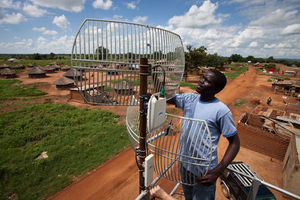The Notre Dame Initiative for Global Development (NDIGD) and Accenture — a global management consulting, technology services and outsourcing company — are taking the lead to empower disconnected communities in northern Uganda by harnessing solar energy to generate electricity for Internet and communications technologies, education and training centers, and new locally developed ventures.
This pilot solar energy project will provide communities in Uganda with clean and efficient renewable power and Wi-Fi connectivity. Entrepreneurial training also will be offered at several sites in Uganda to help create businesses and jobs that can take advantage of this new source of electricity. NDIGD evaluation experts and Accenture will conduct research to measure the impact that these efforts have on the Ugandan communities.

Accenture and the Accenture Foundations have awarded Notre Dame a $550,000 grant for this two-year project. This award reflects Accenture’s global corporate citizenship initiative Skills to Succeed which will equip 250,000 people globally by 2015 with the skills to get a job or build a business. This grant which consists of cash as well as the time and skills of Accenture employees, will help create a solar power entrepreneurship program that—over a two year period—will skill 200 people, create 100 jobs and bcome self-replicating across Uganda. Through this initiative NDIGD and Accenture will help break the barriers to energy poverty currently faced by a majority of the Ugandan population. Currently, only nine percent of Ugandan’s have access to reliable, low-energy electricy.
Tom Yemc, Accenture Managing Director, said, “The University of Notre Dame and Accenture are combining the experience of private enterprise and world class research to make a difference in an area of the world that has been torn apart by war.”
For the past two decades, northern Uganda has been the center of brutal violence instilled by the Lord’s Resistance Army rebels, which resulted in 2 million people being displaced from their homes and tens of thousands kidnapped, mutilated or killed. In recent years, there has been relative stability in northern Uganda, but the people still have limited access to electricity, connectivity and jobs.
The Notre Dame Initiative for Global Development, based in Notre Dame’s Office of Research, is a new multidisciplinary enterprise on the Notre Dame campus that leverages the University’s signature strengths to promote development and human dignity to people around the world who are in need. The initiative helps develop solution-oriented research focused on rigorous, data-driven impact evaluation and assessment; design and planning of development projects; and training.
Accenture Foundation Board Member Samuel Awad, who played an integral role in designing the project as the executive sponsor, said, “The strength of the project focuses on combining three critical resources — solar energy, Internet connectivity and entrepreneurial training — to develop an ecosystem that will foster business opportunities and create jobs.”“We will install solar microgrids that are economically self-sustaining, at scales that can support new ventures for a cadre of entrepreneurs trained at our pilot sites," said Patrick Murphy, former managing director at the Notre Dame Center for Sustainable Energy (cSEND) and current NDIGD program director. "In addition, Notre Dame electrical engineering professor Michael Lemmon’s research on optimal control schemes for microgrids offers a new model for electricity delivery for the 90 percent of Ugandans and the 1.5 billion people worldwide that the electric grid does not serve.”
Notre Dame and Accenture will also work with Ugandan-based partners on this initiative — Battery Operated Systems for Community Outreach (BOSCO), Educate!, and The 31 Lengths Campaign.
BOSCO Uganda is a nonprofit organization founded by Notre Dame alumnus Gus Zuehlke and a partner to the Notre Dame Center for Social Concerns. For the past six years, BOSCO has provided wireless, solar-powered connectivity in communities in rural areas of northern Uganda for socio-economic development and peace building. In 2010, BOSCO Uganda was awarded the Breaking Borders Award in the Technology category from Google and Global Voices.
Educate! develops young leaders and entrepreneurs in Uganda by providing long-term mentorship and two years of world-class leadership training to high school students. Once solar arrays are installed and Internet connectivity is made available, local partner Educate!, with the support of Accenture, will train young business leaders as they create and implement business plans for using the additional electricity.
The 31 Lengths Campaign is led by 2012 Notre Dame MBA graduate Conor Evans. The mission of The 31 Lengths Campaign is to empower students’ potential by connecting resources for business education resulting in economic development to overcome strife and reinforce human dignity. The programming entails daily student mentorship, a business plan competition, a speaker’s series, monthly field trips to regional businesses, and computing, amongst other elements, in support of out of classroom business learning environment.
Notre Dame, Accenture and its partners will then conduct an impact study and make recommendations for future phases of the project.
University of Notre Dame Provost Thomas Burish said, “The NDIGD is helping the University to develop new applied research projects that contribute to the global good, which is part of Notre Dame’s long-range strategic vision.”
Contact: Michael Sweikar, NDIGD associate director, msweikar@nd.edu